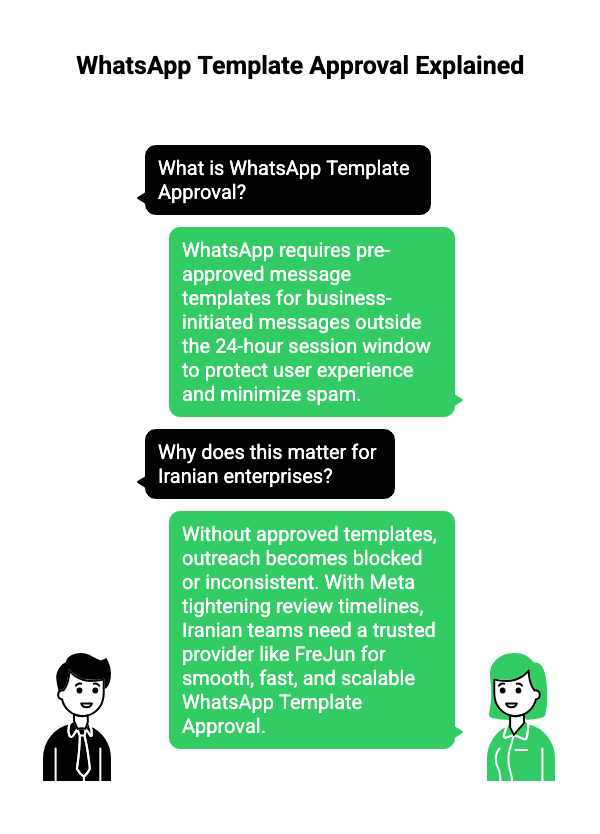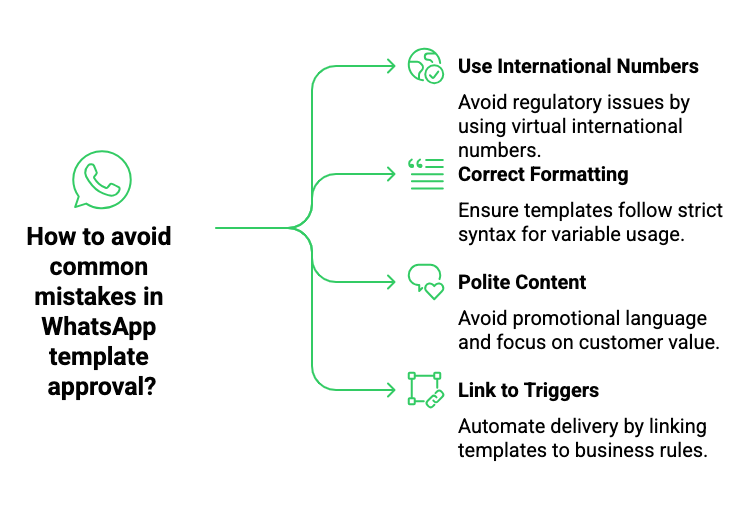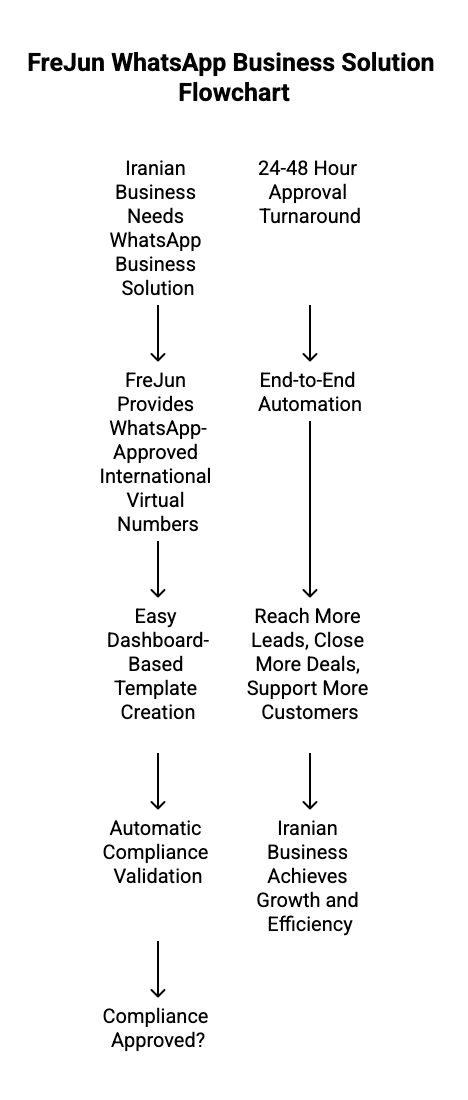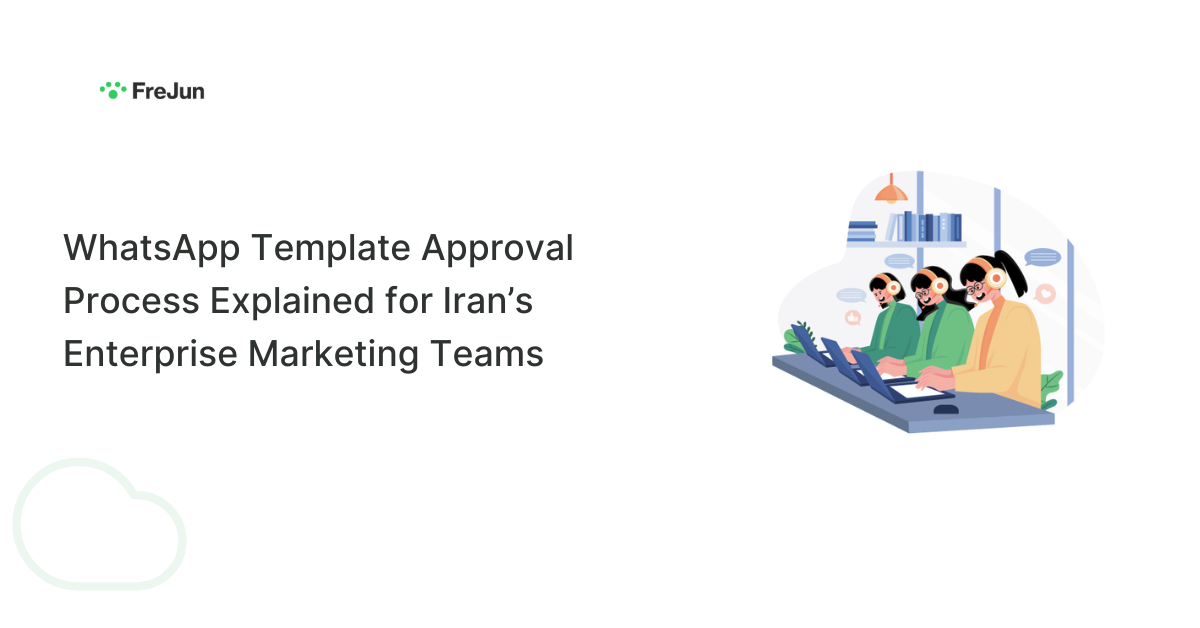For enterprise marketing teams in Iran, WhatsApp has emerged as the most influential channel for customer engagement, lead nurturing, and post-sale communication. However, there’s one major gatekeeper that businesses cannot overlook — WhatsApp Template Approval.
Before your team can send outbound messages (e.g., appointment reminders, promotions, payment updates) to potential or existing customers who haven’t contacted you in the last 24 hours, WhatsApp requires that you use a pre-approved message template.
This article dives deep into the WhatsApp Template Approval process in Iran, exploring how FreJun simplifies this mandatory step by offering local support, international WhatsApp-ready numbers, an intuitive dashboard for template submission, and automation tools for faster campaign execution. Whether you’re managing hundreds of leads daily or running targeted regional campaigns, this guide will help you stay compliant, efficient, and scalable.
Table of contents
What is WhatsApp Template Approval?
WhatsApp Business API is designed for medium to large enterprises to communicate at scale. To protect user experience and minimize spam, WhatsApp (owned by Meta) requires that any business-initiated message outside the 24-hour session window be structured using a pre-approved message template.

These templates must be:
- Clear and non-promotional
- Language-specific and formatted correctly
- Submitted through an authorized API partner (like FreJun)
This approval process ensures quality and consistency across markets — particularly in countries like Iran, where messaging is a dominant communication tool but access to global digital infrastructure is limited.
Why this matters for Iranian enterprises
Marketing and sales teams in Iran often manage hundreds of interactions daily, especially in industries like:
- E-commerce
- Financial services
- Healthcare and wellness
- Real estate
- Educational institutions
Without approved templates, outreach becomes either blocked or inconsistent. And with Meta tightening review timelines and increasing scrutiny, it’s essential that Iranian teams work with a trusted provider like FreJun to ensure WhatsApp Template Approval in Iran is smooth, fast, and scalable.
Why Iranian Businesses Must Prioritize Template Approvals
If you’ve ever tried to send a WhatsApp message to a cold lead or re-engage an inactive customer, you’ve likely hit a wall. That’s because Meta prohibits open-ended messages in such cases. The only workaround? Use a pre-approved template.

Without template approval:
- Messages will not be delivered
- Campaign workflows will break
- Conversion rates drop due to delayed follow-ups
- Your brand risks non-compliance with Meta’s guidelines
Template approval builds a foundation for automation and scale
Iranian enterprises are increasingly adopting automated WhatsApp workflows. FreJun allows you to trigger template messages after events like:
- A missed call from a lead
- CRM stage progression (e.g., from prospect to qualified)
- Abandoned form or cart
- Payment reminder deadlines
But none of this automation is possible without template approvals in place. With FreJun, you can pre-approve multiple template variants (in Persian or English), assign them to events, and start building seamless engagement funnels.
FreJun makes approvals fast, trackable, and reliable
Instead of navigating WhatsApp’s complex Business Manager interface, FreJun users can:
- Draft templates directly in the platform
- Submit them to Meta via API
- Track approval status in real time
- Duplicate or edit templates for re-submission
FreJun also flags formatting issues, placeholder errors, or policy violations before submission — saving you days of back-and-forth.
How FreJun Simplifies WhatsApp Template Approval in Iran

Many enterprise teams in Iran struggle with:
- Repeated template rejections
- Lack of tracking tools
- No support for multilingual templates
- Delays in getting messages live
FreJun solves all of these with:
1. Virtual WhatsApp number provisioning for Iran
Due to restrictions on VoIP and WhatsApp API in Iran, local SIMs or landline numbers often don’t qualify for Business API integration. FreJun solves this by provisioning international virtual WhatsApp numbers from:
- UAE
- UK
- US
These numbers are:
- Pre-verified and API-ready
- Integrated with FreJun’s dashboard
- Compatible with shared inboxes and multi-agent routing
For Iranian teams, this means no need for local telecom providers, no VPNs, and full compliance with Meta policies.
2. Easy template creation with built-in guidance
In FreJun, drafting templates is as easy as writing an email. You can:
- Choose template categories (e.g., Alert, Appointment Update, Payment Reminder)
- Add dynamic variables (e.g., {{name}}, {{amount}}, {{date}})
- Choose language (English, Persian, Arabic)
- Preview how the message appears on mobile
Every template is validated before submission to catch:
- Placeholder formatting issues
- Line break errors
- Policy violations (e.g., overly promotional wording)
3. Fast and trackable submission to WhatsApp
Once your template is ready, FreJun submits it directly to Meta’s approval system via API. No manual ticketing. No guesswork.
You can view real-time status updates:
- Pending – Awaiting review
- Approved – Ready for use
- Rejected – Comes with feedback for revisions
The turnaround time is typically under 24 – 48 hours, and FreJun will notify you the moment a template is approved.
4. Connect templates to powerful automation
Once a template is approved, FreJun allows you to link it to business workflows like:
- CRM stage changes (e.g., Lead → Qualified)
- Missed or rejected calls
- Payment reminders
- Abandoned cart sequences
This is especially useful for Iranian sales teams managing high lead volumes — letting them automate messages while staying compliant.
Types of Templates You Can Submit
For Iran-based enterprise marketing teams, understanding the message categories is vital. WhatsApp divides templates into the following key categories:

High-approval templates used by FreJun customers
FreJun supports multiple industries across the Middle East, including Iran. Some of the most common template categories include:
- Appointment Confirmation
“Hello {{name}}, your appointment with {{agent}} is confirmed for {{date}} at {{time}}.” - Lead Follow-up
“Hi {{name}}, just following up on your interest in {{product}}. Can I help you further?” - Payment Reminder
“Dear {{name}}, your payment of {{amount}} is due on {{date}}. Kindly complete it to avoid disruption.” - Support Response
“We’ve received your request and assigned {{agent}} to assist you. Expect a reply soon.”
Template rules to keep in mind
WhatsApp rejects templates that:
- Include excessive promotional language (“Buy now!”, “Free offer!”)
- Contain special characters, emojis, or external links
- Are not clearly structured or personalized
FreJun’s dashboard guides you away from these mistakes by flagging potential violations before you submit.
Common Mistakes in WhatsApp Template Approval (and How to Avoid Them)
Here are the most common reasons templates are rejected and how to avoid them:

Issue 1: Using local Iranian numbers
Most Iranian numbers won’t pass WhatsApp Business API verification due to regulatory issues. Always request a virtual international number from FreJun to avoid this hurdle.
Issue 2: Poor formatting
Templates must follow a strict syntax, especially when using variables. Instead of writing:
“Hi, {{name, your appointment is scheduled at {{time}}”
Correct version:
“Hi {{name}}, your appointment is scheduled at {{time}}.”
Issue 3: Rejected for tone or content
WhatsApp does not allow unsolicited promotional messaging. Templates should always:
- Be polite and service-oriented
- Avoid words like “discount,” “free,” or “sale”
- Focus on providing value to the customer
FreJun helps detect risky content before submission.
Issue 4: Not linking approved templates to triggers
Even after a template is approved, it won’t do much unless it’s linked to a business rule or action. FreJun lets you automate delivery based on:
- Call outcomes
- CRM updates
- Missed chat events
- Date-based reminders
Key Takeaway
When it comes to enterprise-grade WhatsApp communication in Iran, understanding and streamlining the template approval process is essential. Without it, your team’s outreach efforts can face delays, rejections, and compliance risks. FreJun offers the tools and infrastructure to make WhatsApp Template Approval in Iran fast, easy, and scalable.
Here are the most important points you should remember:

- Template approval is mandatory for sending outbound messages on WhatsApp Business API
- Local Iranian numbers are not API-compatible — FreJun provides international, verified WhatsApp numbers
- FreJun simplifies the process with a guided dashboard, submission tracking, and rejection feedback
- Approved templates can be automated, connected to calls, CRM updates, or form completions
- Avoid common mistakes by using proper formatting, clear language, and dynamic variables
By using FreJun, Iranian marketing teams can remove the friction from WhatsApp outreach — unlocking higher conversions, better compliance, and smoother customer experiences.
Final Thoughts
For marketing teams in Iran, the WhatsApp Template Approval process isn’t just a technical necessity — it’s the foundation for compliant, automated, and high-performing customer engagement.

FreJun removes the complexity by offering:
- WhatsApp-approved international virtual numbers
- Easy dashboard-based template creation
- Automatic compliance validation
- 24–48 hour approval turnaround
- End-to-end automation linking templates to calls, CRM, and chat triggers
This gives Iranian businesses everything they need to reach more leads, close more deals, and support more customers without breaking Meta’s rules or wasting time on manual workflows.
Ready to launch approved WhatsApp templates in Iran within 48 hours?
Get started with FreJun today and unlock the full power of WhatsApp Business API for your enterprise.
Further Reading – UAE Numbers: 7 Best Providers for Virtual Phone Numbers
FAQs
No. Due to regional restrictions, most local VoIP numbers are not supported. FreJun provides international WhatsApp-approved virtual numbers from trusted regions like the UAE, UK, and US.
Most templates are reviewed and approved within 24 to 48 hours. FreJun submits them via API and tracks their progress in real-time.
Yes. You can add dynamic fields (e.g., {{customer_name}}, {{amount}}) to personalize your messages. FreJun ensures these placeholders are correctly formatted.
FreJun provides the rejection reason and allows you to duplicate, revise, and resubmit the template quickly — without starting from scratch.
Yes. With FreJun’s automation tools, you can schedule template messages to send at specific times — even when your team is offline.
